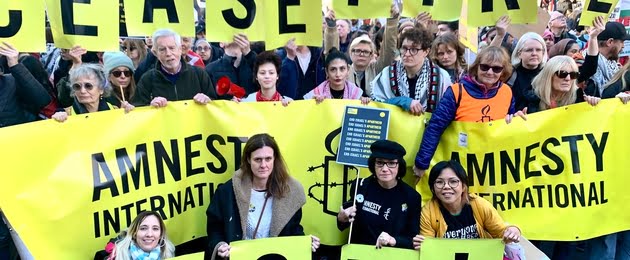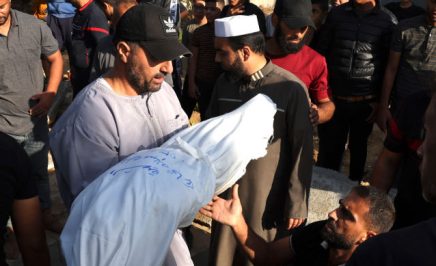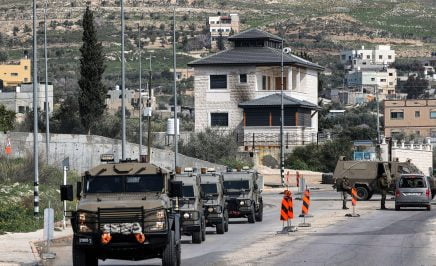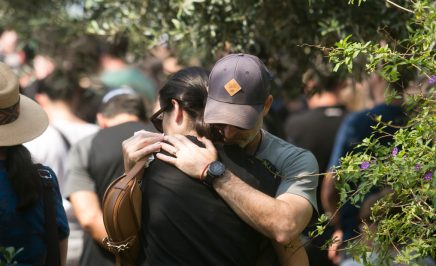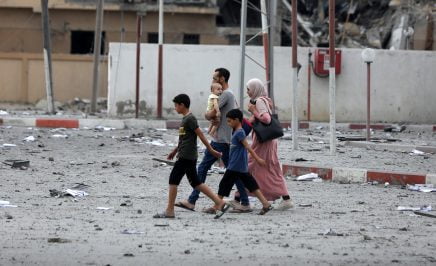UPDATE 22 December, 2023: After many delays the United Nations Security Council has adopted a compromised resolution calling for “urgent steps to immediately allow safe and unhindered and expanded humanitarian access” to Gaza and creating “the conditions for a sustainable cessation of hostilities”. This follows a stronger resolution from the UN General Assembly on 12 December calling for a ceasefire. Amnesty International considers this an important but insufficient step. Now, the Australian government must use every opportunity to continue to call for an immediate ceasefire and unfettered humanitarian access to Gaza.
The eruption of violence on an unprecedented scale between Israel and Palestinian armed groups has seized the world’s attention. The brutality inflicted on civilians by both sides in the conflict has shocked the world.
The attacks by Palestinian armed groups were quickly and rightly condemned by the international community. But it’s Israel’s unrelenting assault on Occupied Palestinian Territories that has caused by far the greatest devastation.
Aerial bombardment and a ground invasion of Gaza by the Israeli Defence Forces (IDF) have created a desperate humanitarian disaster. As military operations are carried out with little apparent regard for civilian lives, the death toll is now over 11,000 and climbing daily.
Around the world, hundreds of thousands of protestors have turned out to call for a ceasefire. Countless more have taken their activism online. But online we all face a barrage of mis- and disinformation and myths.
The Influence of Social Media
Both social media and traditional media are flooded with mis- and disinformation. Social media censorship and selective algorithms mean that audiences who rely on these platforms for news receive a skewed version of the events. Although there have been relatively few instances of fake content generated by artificial intelligence, its mere presence leads some audiences to doubt everything they see.
Content is constantly shared that isn’t verified. This can be misleading or entirely false, which leads to confusion.
Recognising False Narratives in the Israel-Gaza Conflict
With so many false narratives and such high stakes, it’s crucial everyone knows how to fact-check the information they come across. Here are three simple ways you can help stop the spread of false information:
- Don’t share anything without first reading it in full
- Always verify the source of information
- Look out for dehumanising language.
Beware of Dehumanising Language
Everyone should be extra vigilant about dehumanising language used against any group. Describing a group of people as “animals,” beasts”, or “monsters” is a tool that has historically been used to erode empathy and excuse unthinkable acts. This is one of the most harmful and dangerous forms of propaganda, and it should always be called out.
Eight Popular Myths Debunked
Whether or not there’s a deliberate attempt to mislead, all false narratives add to the confusion and sow division by obscuring the real facts. In the list below, we’ve responded to some of the most common myths and misconceptions surrounding the Gaza-Israel conflict.
Myth 1: Israel can violate international humanitarian law because it has a right to defend itself.
Since the bombardment of Gaza began in early October, many have accused Israel of violating international humanitarian law and of committing war crimes. Israel and its supporters have dismissed these accusations, often by arguing that Israel has a right to defend itself.
Truth: Amnesty has documented multiple actions by Israel that constitute clear violations of international humanitarian law, including war crimes. We’ve been clear that the cutting off of food, fuel, electricity, and water amounts to collective punishment of Gaza’s civilian population. This is defined as a war crime in the Geneva Conventions.
Parties to any conflict must always comply with international law. Amnesty – alongside organisations including the UNHCR, Human Rights Watch, and the ICRC – has stated that Israel is violating international law, including through collectively punishing the people of Gaza.
Israeli ministers have said that the authorities won’t restore power or allow water or fuel to enter until Hamas releases hostages. This is explicit confirmation that these acts have been taken to punish civilians in Gaza for the actions of Palestinian armed groups.
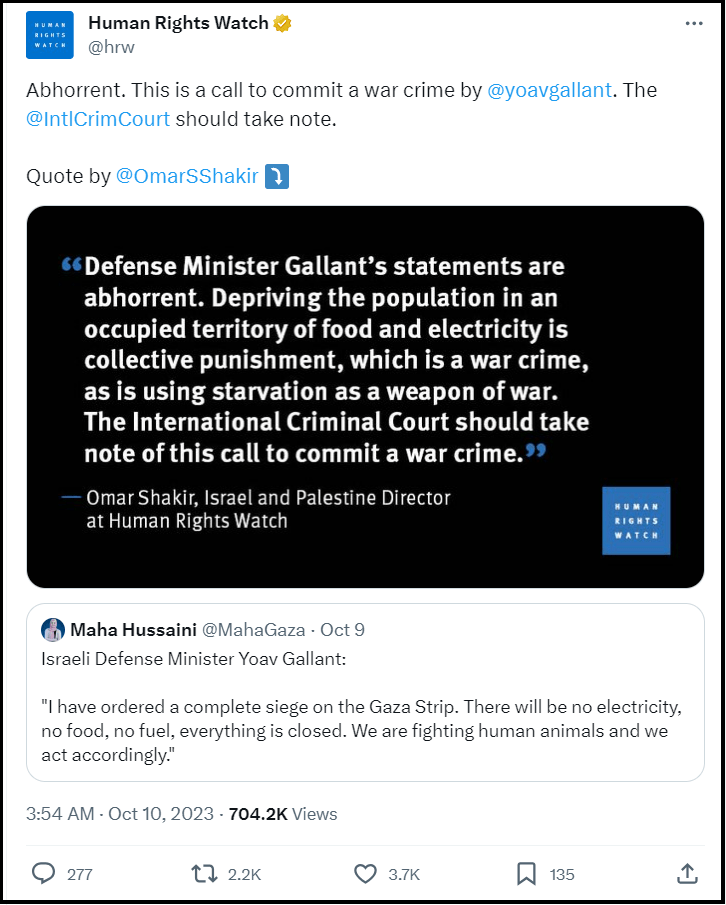
Palestinian civilians aren’t responsible for the crimes of Hamas and other Palestinian armed groups. Israel must not, under international law, make them suffer for acts they play no role in and can’t control.
Beside the collective punishment of civilians, Amnesty has documented other breaches of international humanitarian law by Israel. These include:
- Indiscriminate airstrikes on residential buildings by the Israeli Defence Forces, which have killed entire families.
- The use of white phosphorus by the Israeli Defence Forces in populated civilian areas of Gaza and Lebanon, which may be considered unlawful indiscriminate attacks.
Myth 2: Israel isn’t required to show restraint in its response to the 7 October attacks.
Following the 7 October attacks on Israel, some politicians and commentators took the position that no response could be considered too extreme.
Australian Leader of the Opposition Peter Dutton has said his party “won’t be urging any restraint from the Israeli people at the moment.” He has urged Israel to do “what is necessary […] to protect its people, and to thwart threats it now faces.”
In the United States, Republican Senator Lindsay Graham was even blunter in his endorsement of collective punishment of Gaza. “Whatever the hell you have to do to defend yourselves; level the place.”
Truth: Israel, like any party to a conflict, must always show restraint by protecting civilians and minimising harm to civilians and civilian objects.
Under international humanitarian law, all sides in a conflict have a clear obligation to protect the lives of civilians, and to always take all feasible precautions to minimise harm to civilians and “civilian objects” such as residential buildings, schools and hospitals.
Israeli authorities say they’re targeting Hamas fighters, not civilians. But Amnesty has documented damning evidence that this isn’t the case, including attacks where Amnesty’s research has found no evidence of military targets. Amnesty’s Secretary General said that “in their stated intent to use all means to destroy Hamas, Israeli forces have shown a shocking disregard for civilian lives”.
Israel has repeatedly attacked refugee camps, hospitals and residential buildings. As of 13 November, Israeli attacks have damaged or destroyed around half of all housing in Gaza.
Myth 3: People in Gaza can evacuate to safety.
Many people have argued that the Israeli army gives people sufficient warnings to evacuate, and, if the Israeli army gives warning to evacuate, then those who remain should be treated as members of an armed group.
The Israeli Defence Force has dropped leaflets on northern Gaza that stipulate anyone who chooses not to leave “may be determined an accomplice in a terrorist organisation.”
Truth: The majority of Gaza’s population are descendants of refugees who were displaced and forced to flee their homes in 1947-49. During this time, more than 750,000 Palestinians were forcibly displaced from their towns and villages, an event referred to by Palestinians as the Nakba (meaning the catastrophe).
While many Palestinians in northern Gaza are fleeing, others have told Amnesty that they are choosing to stay for fear this could become a “second Nakba”. The generational trauma of displacement is etched in the collective memories of many Gazans.
“Our parents were expelled from their homes in 1948 during the Nakba,” Munir Radwan, a university professor, told Amnesty. “We lost our house, which was destroyed in the August 2022 offensive; our rebuilt house was destroyed again…all our lives we have known nothing but a series of displacements.”
Besides, nowhere in Gaza is safe. Amnesty has documented attacks on people fleeing northern Gaza that killed 70 people.
Amnesty is concerned that the Israeli army’s order to people in northern Gaza and Gaza city to “evacuate” to the south of the Gaza Strip may amount to forced displacement of the civilian population, a violation of international humanitarian law.
Leaflets ordering residents of northern Gaza to leave fly in the face of international humanitarian law, which stipulates that parties must distinguish at all times between civilians and combatants.
We’re also calling on the international community to oppose any planned deportation of the people of Gaza to Egypt, to halt forced displacement of Palestinians, and to recognise Palestinian refugees’ right to return.
Myth 4: Israel does everything it can to avoid civilian deaths.
In repeated cycles of conflict, Israeli officials have claimed the IDF does everything it can to avoid civilian deaths. They have said the IDF always gives advance warning of airstrikes.
Truth: Amnesty has documented airstrikes by the Israeli Defence Forces that violated international humanitarian law. The violations include: failing to take feasible precautions to spare civilians; carrying out indiscriminate attacks that failed to distinguish between civilians and military objectives, and carrying out attacks that may have been directed against civilian objects.
These attacks have pulverised street after street of residential buildings, killing civilians on a mass scale. In some of the attacks we documented, we spoke with survivors who said that no warning was given before their homes were attacked.
In the most recent outbreak of violence prior to 7 October (in May 2023) and in previous outbreaks, Amnesty has consistently documented disproportionate airstrikes that killed and injured Palestinian civilians, including children. Some of these attacks amount to the deliberate destruction of civilian objects by the IDF.
In our investigation into the May 2023 conflict, we heard vivid accounts of bombs obliterating homes, of fathers digging their little girls out from under rubble, of a teenager fatally injured as she lay in bed holding a teddy bear.
That we’ve been documenting the same patterns of unlawful killings and destruction over many years, and that the people of Gaza continue to be subject to these attacks, is distressing. It’s an indictment of the international community’s failure to hold Israel accountable for violations of international humanitarian law.
Myth 5: Hamas didn’t deliberately kill civilians on 7 October.
Some spokespeople for Hamas have denied they deliberately targeted civilians in their 7 October attacks on Israel. This claim has also appeared in social media posts, with videos seeking to debunk the acts of violence reportedly carried out by Hamas.
Truth: There’s clear evidence that Hamas targeted civilians. Video footage analysed by Amnesty International’s Crisis Evidence Lab shows Palestinian fighters on the initial day of the attacks deliberately shooting at civilians and taking civilians as hostages. They also attacked people attending a music festival, firing indiscriminately on the crowd, resulting in around 260 deaths.
Massacring civilians is a war crime and there is no justification for these reprehensible attacks.
Hamas committed horrific acts of violence against civilians on 7 October. They also took civilians as hostages, most of whom still haven’t been released. This is a war crime.
Israel’s well-documented crimes under international law against Palestinians don’t justify these appalling acts by Palestinian armed groups. Likewise, Hamas’ cruel attacks on civilians don’t justify Israel’s collective punishment of the people of Gaza or indiscriminate attacks on civilians. War crimes by one party in a conflict can never justify war crimes by the other..
Myth 6: The Palestinian death toll being reported isn’t reliable.
In a White House press conference on 25 October, a reporter asked President Joe Biden if the mounting death toll in Gaza meant Israel was ignoring calls to protect civilian lives. The President replied that he had “no notion that the Palestinians are telling the truth about how many people are killed.”
At that time, the Palestinian death toll had reached 6,500, of which 2,700 were children. As of 15 November, that number has surpassed 11,000, of which over 4,000 are children.
Truth: Historically, the death counts issued by Gaza’s health ministry have held up to scrutiny by the UN, independent investigators, and even Israel itself.
President Biden didn’t explain why he was sceptical of the reported death toll. However, others have said they distrust the numbers because they’re issued by Gaza’s health ministry, which is run by Hamas.
There’s nothing to indicate that the Gaza health ministry is exaggerating the death toll. Michael Ryan of the World Health Organization’s Health Emergencies Program explained:
“The numbers may not be perfectly accurate on a minute-to-minute basis, but they largely reflect the level of death and injury.”
In all previous conflicts, tallies reached by the UN have been broadly consistent with those provided by Gaza’s health ministry.
Myth 7: Criticism of Israel is antisemitic.
In recent years, attempts have been made to conflate criticism of the Israeli government with antisemitism.
For example, the International Holocaust Remembrance Alliance (IHRA) has proposed a working definition of antisemitism that critics say has been used to suppress criticism of Israel’s human rights violations. In April 2023, Amnesty was one of 104 organisations who opposed a move by several member states for the UN to adopt this as a non-legally binding definition of antisemitism.
Following the IDF’s siege of Al-Shifa Hospital in Gaza, Australian Foreign Minister Penny Wong asserted that hospitals and medical patients must be protected under international law. In response, the Zionist Federation of Australia and the Executive Council of Australian Jewry issued a joint statement accusing Wong of stoking antisemitism. The statement said:
“The libel that any Israeli attack on Gazan hospitals from which Hamas operates would amount to war crimes only serve to demonise the state of Israel and its supporters. These libels are central to Hamas’ objectives as a terrorist organisation, and are reverberating across the world in a new wave of antisemitism.”
Truth: Criticism of the Israeli government isn’t antisemitic. Israel is a state, not a religious or ethnic group. We must always distinguish the State of Israel from the Jewish people, and Israel must be held to the same standards as any other state.
Many experts on antisemitism and Jewish studies, as well as Palestinian, Israeli, and international human rights groups including Amnesty, have challenged the IHRA’s definition of antisemitism, which has been used to stifle debate and criticism of the Israeli government’s human rights record.
The joint statement to Penny Wong was likewise an attempt to silence legitimate human rights concerns. Protecting hospitals and civilians from attacks should always be welcomed and applauded. No one should be “highly concerned” by a plea to save civilian lives.
Antisemitism must be condemned, and must be addressed. Jewish people and people perceived to be Jewish should always be distinguished from the Israeli authorities and their policies or the violation of Palestinians’ rights.
As anti-semitism and Islamophobia rise around the world in response to the conflict, branding fair criticism of Israel’s human rights record as antisemitic undermines the fight against genuine antisemitism.
Myth 7: The slogan “From the river to the sea, Palestine will be free” is antisemitic hate speech and a veiled call for the destruction of Israel.
In the last month, this chant has been heard at pro-Palestinian demonstrations around the world. Supporters of Israel have claimed this is a Hamas slogan rooted in antisemitism. According to these critics, it’s calling for the destruction of Israel and the Jewish people.
Truth: This slogan emerged in the 1960s and has been used by many different groups. For some, it is aggressively anti-Israel. For many others, it simply calls for equal rights and freedom from apartheid for the Palestinian people, who have been oppressed and fragmented for over 70 years.
Interpretations might vary, but there’s nothing in the words themselves that suggests antisemitism or calls for racial or political dominance over Israel. The assumption that calling for freedom for Palestinians necessitates the destruction of the State of Israel is a manipulation of this phrase.
Myth 8: Israeli people all support the actions of the Israeli government.
There’s a perception that all Israeli people support Israel’s military actions in Gaza. It’s sometimes also assumed that all Jewish people support the Israeli government.
Truth: Like everyone else, Israeli and Jewish people hold differing opinions of the Israeli government. Many of them – both within and outside of Israel – have called out the Israeli army’s war crimes, called for a ceasefire and led protests.
Australian Jewish groups who support Palestinian rights and oppose the Israeli government’s actions in Gaza include Jews Against the Occupation, Jews Against Fascism.and the Tzedek Collective.
Eve Altman, one of the organisers of a Jewish vigil held in Sydney for Israeli and Palestinian victims of the conflict, said: “As a community a lot of Jews don’t want the grief we are still feeling to be used as justification for taking innocent lives.”
Fight Misinformation. Educate Yourself.
This conflict is far from the first time that international law has been breached in Israel and the Occupied Palestinian Territories. Since 2007, Israel has imposed an illegal air, land and sea blockade on the Gaza Strip, collectively punishing its entire population, another tool of apartheid.
The injustices and violations that are among the root causes of this violence must be addressed as a matter of urgency. For over 70 years, Palestinians have been forcibly displaced and dispossessed of their homes by the Israeli government. Their homes have been demolished and destroyed. Millions of Palestinians in the West Bank are subject to Israel’s draconian military rule, and they face regular raids carried out with excessive and deadly force.
These are some of the tools of Israel’s apartheid system against Palestinians. This system amounts to a crime against humanity under both the Apartheid Convention and the Rome Statute. Civilians, Palestinians and Israeli, will continue to pay a heavy price until Israel dismantles its system of apartheid against Palestinians, including ending its illegal blockade on Gaza.
Amnesty has produced a toolkit with information and resources to educate yourself, have informed conversations and take positive action.
